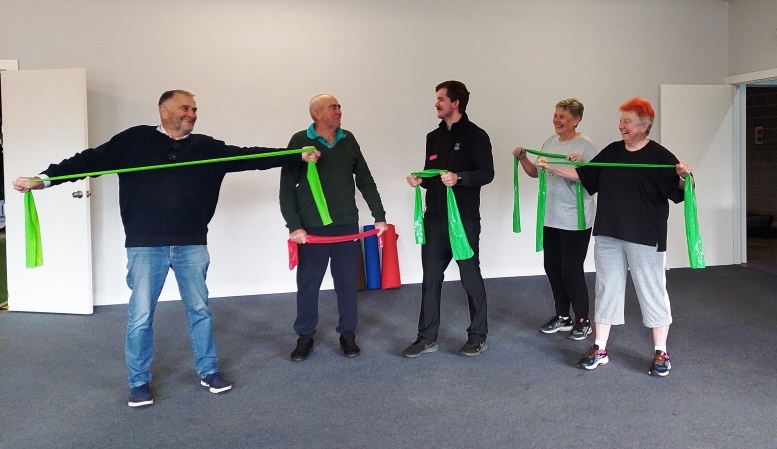Andrew Gallagher
A consistent theme that I have referenced in the healthy Daylesford column, is the role that exercise plays in enhancing health and preventing disease and disability. While engaging in regular exercise is important during all life stages, as discussed in previous articles, there is a growing body of evidence of it’s importance as we age.
The “Put a Spring in Your Step” (SIS) program offered through Springs Medical is an eight week wellness program incorporating exercise and education to help you live well. It recognises the importance of equipping participants with the knowledge and skills to manage their own health. It utilises a wholistic approach with the modality of exercise at its core. While SIS is not unique in its recognition of the role exercise plays in maintaining health and preventing disease, it is unique in that is fully integrated into the Primary care services offered at Springs medical.
This recognition of exercise as intrinsic to medical care, while a relatively recent development in the context of our local community, has long had a place in the history in medicine. Throughout history and in both western and eastern approaches to treating health, exercise has been incorporated as an essential practise, be it the gymnasia of the Greeks and Romans, Tai chi as taught in traditional Chinese medicine or Yoga as practised in the Avurveda tradition.
Unfortunately the nexus between and health and exercise fell out of favour in western medical traditions due to both religious beliefs and the influence of 17th century French philosopher Rene Descartes. He is responsible for the concept of dualism, that humans can be divided into two parts – the mind and the body. Descartes’ philosophical approach ceded the mind over the body as he saw the mind as holding our consciousness, our understandings and our sense of self. These concepts gave rise to one of Descartes’s most famous quotes: ” I think therefore I am”. The prevailing religious beliefs of European Christianity focused on concepts of the soul or spirit as being of a higher order that transcended the physical form i.e the body. The body or corpus was seen merely as temporary vessel whose eventual demise was necessary to achieve salvation of the soul . Emphasis on the physicality of the body was seen as prideful and intertwined with a puritanical outlook that assigned any aesthetic consideration of body as necessarily sinful. The development of the spirit was to be promoted over that of the body.
It was not until the early 19th century that in western culture the importance of exercise for promoting physical and mental well being was rediscovered. This was in large part due to the pioneering work of Pehr Henrik Ling, the fencing master at Lund University Sweden.
Having experienced the benefits of engaging in gymnastics after a period of ill health, Ling decided to apply this experience to the benefit of others. Over several years and including the completion of formal medical training, Ling developed a system of exercises he described as medical or remedial gymnastics. After initial resistance from the orthodox medical profession and with the support of the Swedish Government he went on to establish the Royal Central Gymnastics Institute in 1813. Over time Ling’s methods became more widely accepted in the medical profession, spreading throughout Europe and indeed across the world. Ling’s Medical Gymnastics is now practised universally but is now referred to more commonly as Physiotherapy.
The SIS program as offered at Springs Medical continues the legacy of Henrik Ling utilising a clinical framework that views exercise as medicine. Accordingly, referral to the SIS program by your Doctor can be likened to any other medical prescription. In this instance however, it is an “exercise prescription.” This prescription, while taking into account your specific health needs, will encompass the following general aims:
- To increase your strength and exercise tolerance.
- To improve your quality of life
- To increase your confidence and ability to self manage and cope with your condition.
- To keep you out of hospital
- To encourage life-long behaviour change
The program can therefore benefit a range of medical conditions including respiratory, cardiovascular orthopaedic and neurological conditions. In addition SIS can assist in improving your mobility, balance and play a critical role in falls prevention.
What does SIS involve?
- A 1hr health assessment looking at your medical history, discussing your goals, making some base line observations and scheduling your gym sessions.
- A 30 minute gym assessment so our Exercise Physiologist can develop an individualised exercise program suited to your medical status, ability and goals.
- 2 x 30min gym sessions each week at Springs Medical’s own fully equipped gym facility.
- An 8 week review and option for an additional 6 week maintenance program.
To get involved make an appointment with your GP to assess eligibility for the SIS program.
What are you waiting for ,PUT A SPRING IN YOUR STEP TODAY!




